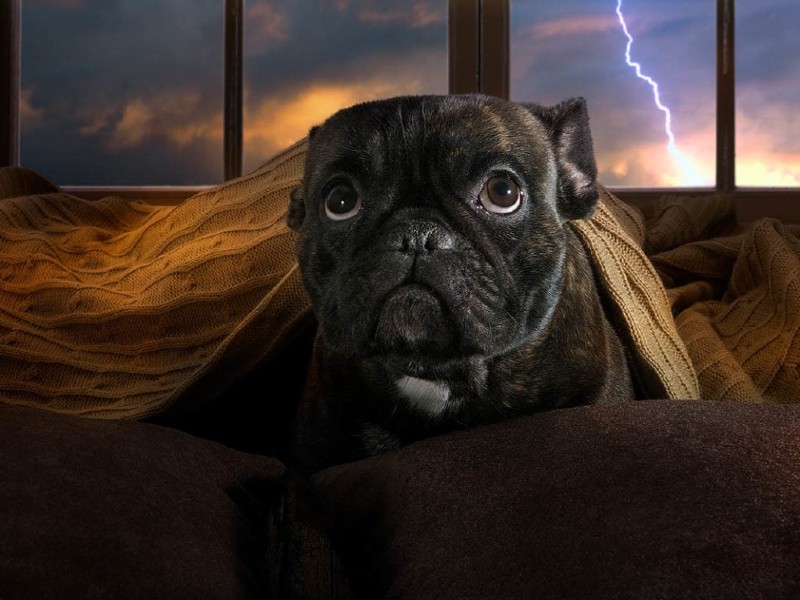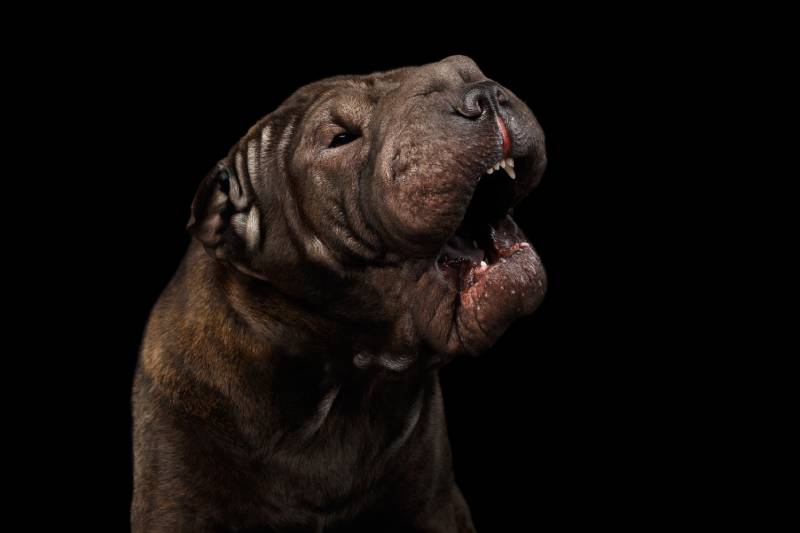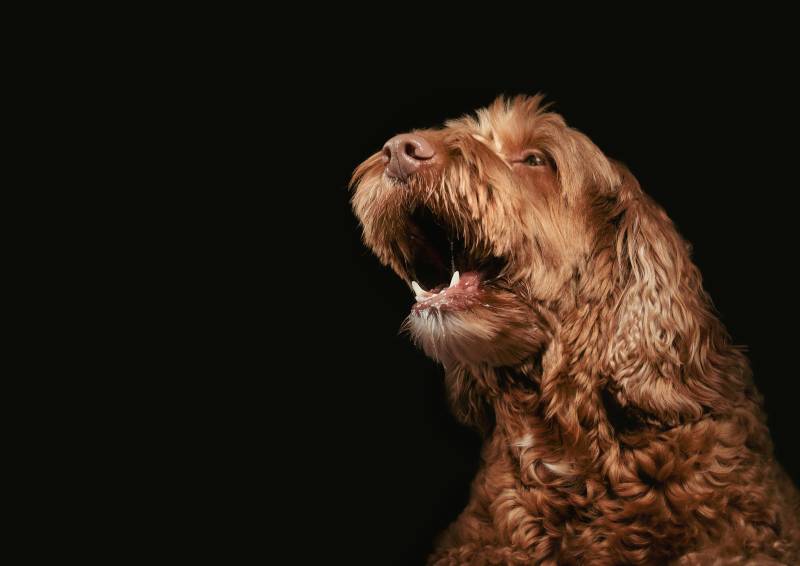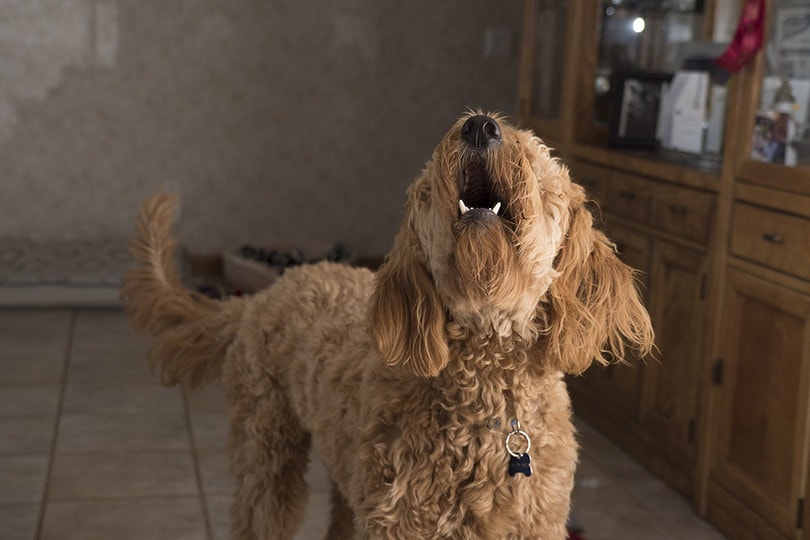Do you have a dog that barks anytime thunder starts to rumble off in the distance? It can be annoying to put up with a barking dog. For some people, thunderstorms are relaxing to listen to, and they are a frightening experience for others. Either way, a barking dog only makes the situation unpleasant. There are multiple reasons that your dog might bark at thunder, though. By better understanding these reasons, you’ll be able to know what your dog might need from you during storms.
The 7 Reasons Why Dogs Bark at Thunder
1. Fear
| Type of response | Instinctual |
| How to help | Provide comfort and reassurance |
The sound of thunder can be frightening for people who understand what thunder is, so imagine how it can make a dog feel! No amount of explaining will help your dog understand what the loud banging noises outside the house are, which can make thunder an extremely scary experience for your dog. They don’t understand what they’re hearing because they can’t see anything associated with it unless you count lightning and rain, both of which can also be fear-inducing for some dogs. And, it’s important to know that if your dog is fearful of thunder, they will often exhibit signs other than just barking, like pacing and panting. Provide lots of reassurance and comfort, along with a cozy place for your dog to spend time during storms.
One of our favorite doggy TV shows explores this concept with a bit of humor. Chief, one of the main characters, faces off against the loud barking dog in the sky, more commonly known as thunder.
Could it be that all dogs that bark at thunder think it’s a big dog in the sky? Watch HouseBroken Sundays on FOX and stream the next day on Hulu to see what happens.

2. Discomfort
| Type of response | Physiological |
| How to help | Provide a comfortable space |
Dogs are more sensitive to the barometric pressure changes associated with storms than people are. This can lead to an extremely uncomfortable sensation for your dog whenever storms hit or are on the way. Your dog can feel the pressure changes in the atmosphere, and this discomfort may lead to your dog barking due to confusion or generalized discomfort. This is especially likely if your dog has medical conditions that may be exacerbated by pressure changes, like arthritis.
There is little you can do for your dog in relation to this type of discomfort, but making sure they have a comfortable and quiet spot to spend time during the storm can make a big difference. If you think your dog is having pain related to pressure changes, talk to your vet about management options.
3. Instinct
| Type of response | Instinctual |
| How to help | Provide comfort and reassurance |
For wild animals, loud noises can mean death. Think of all of the things in nature that create loud noises, from stampedes to falling rocks and trees. Early dogs had to develop instincts that kept them alive and safe, and those instincts included a fight or flight reaction to loud noises. In modern dogs, these instincts are largely unnecessary for survival, which can lead to some dogs barking during natural events like thunderstorms.
Helping your dog feel safe during thunderstorms, as well as working to reduce your own stress and anxiety levels, can help significantly.

4. Protection
| Type of response | Instinctual, environmental |
| How to help | Reduce your stress, provide reassurance |
Some dogs feel the need to protect their family whenever they hear loud noises, and thunder may be a trigger for your dog to bark in an effort to protect you from what’s happening that they’re unable to see. This is a combination of a fear, stress, and instinct response, and dogs that have had to provide protection to you during noisy events may feel more driven to bark during thunderstorms.
By reducing your stress and providing plenty of reassurance to your dog, you may be able to reduce their stress surrounding thunder and help them recognize that you’re safe.
5. Dislike of Rain
| Type of response | Physiological |
| How to help | Positive reinforcement |
Some dogs have extremely strong feelings about rain. If your dog is a rain hater and associates thunder with rain, they may bark at the sound of thunder in an effort to “stop” the rain from occurring. Some dogs don’t like for their feet to get wet or just overall dislike being rained on, while other dogs may associate getting rained on with things like baths.
There is little you can do if your dog hates rain, but positive reinforcement when your dog ventures into the rain for a quick potty trip can really help with overcoming this storm-related phobia.

6. Negative Experiences
| Type of response | Environmental |
| How to help | Provide comfort and reassurance |
If your dog has had negative experiences specifically related to storms, like being locked outdoors in a storm overnight, or related to loud noises, like fireworks, then it’s possible that your dog may bark at thunder due to fear or uncertainty surrounding the noise itself. This is different from an instinct-driven fear response related to storms.
If your dog has experienced something negative regarding storms or loud noises, you may need to provide extra comfort, reassurance, and a calm, quiet place to spend time to help your dog feel safe and confident.
7. Your Anxiety
| Type of response | Instinctual |
| How to help | Reduce your anxiety |
This one may be the most difficult to remedy because it relies almost entirely on managing your own feelings. Dogs are very sensitive to our emotions, and many people have fear and anxiety around thunderstorms. If you have anxiety when it thunders or storms, your dog can easily pick up on your anxiety.
When we’re anxious, it makes our dogs anxious, likely because it causes them to feel like there’s a threat they’re not aware of. By finding ways to distract yourself and reduce your anxiety during storms, you can help your dog relax and feel more secure.
Conclusion
Barking at thunder or during storms isn’t an unusual response for a dog, but it can be undesirable behavior. It may take time for you to identify the cause or causes of your dog’s barking at thunder, but once you’ve identified the cause, you’ll be better prepared to help your dog overcome the behavior. If you’re ever unsure, your vet or a dog trainer specializing in behavior modification will likely be able to help you narrow down the causes.
Featured Image Credit: dahancoo, Pixabay











